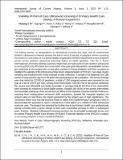| dc.contributor.author | Mbogo, Bernard | |
| dc.contributor.author | Opanga, Yvonne | |
| dc.contributor.author | Mutua, Mercy | |
| dc.contributor.author | Muhula, Samuel | |
| dc.contributor.author | Lugayo, Denge | |
| dc.date.accessioned | 2022-11-18T14:51:53Z | |
| dc.date.available | 2022-11-18T14:51:53Z | |
| dc.date.issued | 2022-11-15 | |
| dc.identifier.citation | Mbogo, B., Opanga, Y., Mutua, M., Muhula, S., & Lugayo, D. (2022). Empowering Communities against Harmful Social Practices through Integrated Water Hygiene and Sanitation and Alternative Rites of Passage Model in Kajiado County, Kenya. East African Journal of Interdisciplinary Studies, 5(1), 242-253. https://doi.org/10.37284/eajis.5.1.962 | en_US |
| dc.identifier.issn | 2707-8035 | |
| dc.identifier.other | DOI: https://doi.org/10.37284/eajis.5.1.962 | |
| dc.identifier.uri | https://repository.amref.ac.ke/handle/123456789/825 | |
| dc.description | This is an open-access article published and distributed under the terms and conditions of
the Creative Commons Attribution 4.0 International License of United States
unless otherwise stated. Access, citation and distribution of this article is allowed with full
recognition of the authors and the source. Copyright, content ownership and liability for
content herein remain with the authors. | en_US |
| dc.description.abstract | The limited number of sonographers in developing countries and high cost of conventional
obstetric ultrasound screening services has led to only 6.9 percent of pregnant women accessing
the service in rural areas. It is a World Health Organization (WHO) requirement to have pregnant
women access obstetric ultrasound screening before 24 weeks gestation. This led to Amref
International University piloting a business model that can make point of care obstetric ultrasound
screening (POCUS) affordable and sustainable. One-year post intervention, an evaluation survey
got conducted in the project sites in two pilot counties in Kenya (Kajiado and Kisii counties) to
establish the viability of the entrepreneurship driven implementation of POCUS. Two stage cluster
sampling was employed with mixed methods of data collection. A sample of 33 Midwives and 196
women of reproductive age from the pilot sites participated in the evaluation. The survey findings
were that midst the COVID-19 pandemic, a total of 1250 pregnant women were screened in one
year at a fee of USD 5 per scan. Among those interviewed, 168 (85.7%) of the women confirmed
the service was affordable and easily accessible. It emerged that 85 (43.4%) of the respondents
were screened by midwives in local health centres. Notably,180 (91%) of the women interviewed
recommended scaling up of the service and 32 (96%) of the midwives reported that the continuous
coaching from radiographers enhanced skills acquisition. Despite the marginal negative net
present value of cash flows, the impact generated by the project was of high significance. The
conclusion drawn was that the business model is viable from implementation perspective since it
demonstrated the potential to reach a Break-Even Point (BEP) at a modest of 1833 ultrasound
scans per year. The project has potential for further buy-in by Primary health care professionals
having accorded them a gross margin of 60% with a probable increase to 80% in subsequent
years. Further, Obstetric Ultrasound screening services can be provided sustainably at low cost
by trained Primary Health Care Workers (PHCWs). Financial viability of the POCUS is subject
to increasing pregnant women’s access to POCUS. | en_US |
| dc.language.iso | en | en_US |
| dc.publisher | Scientific Research Publishing | en_US |
| dc.subject | Point of Care Ultrasonography Screening (POCUS) | en_US |
| dc.subject | Miidwives | en_US |
| dc.subject | Antenatal care (ANC) | en_US |
| dc.subject | Business Model | en_US |
| dc.title | Empowering Communities against Harmful Social Practices through Integrated Water Hygiene and Sanitation and Alternative Rites of Passage Model in Kajiado County, Kenya | en_US |
| dc.type | Article, Journal | en_US |

